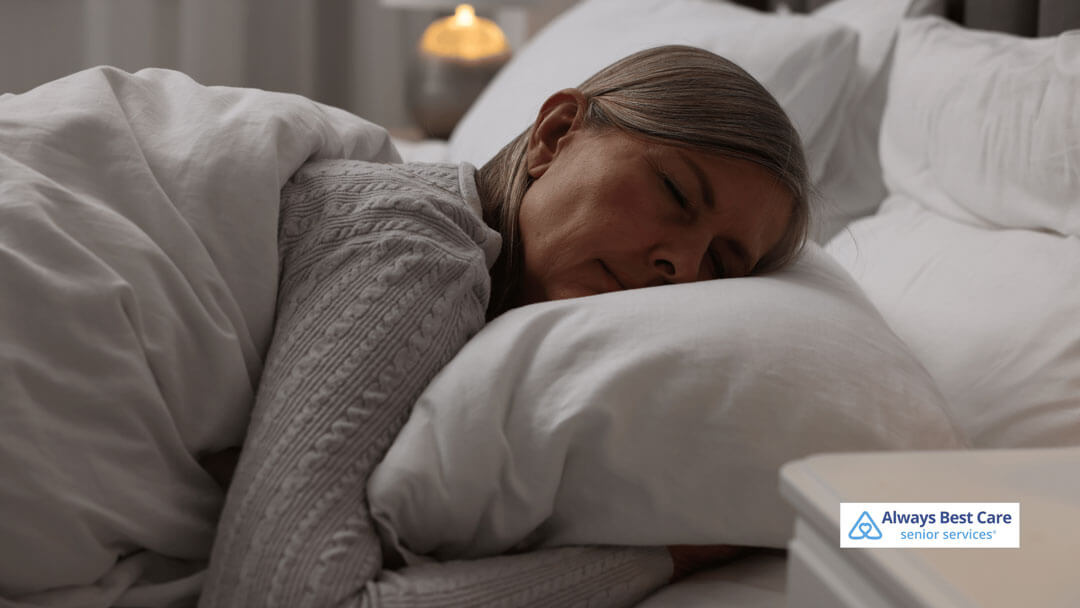Sleep Better Tonight: 8 Essential Tips for Seniors

Sleep can become more elusive as we age, leaving us tired and less energetic during the day. While many seniors experience difficulty falling or staying asleep, there are practical ways to improve sleep quality and wake up feeling refreshed.
Here are eight essential tips that can help you sleep better tonight!
Table of Contents
1. Understand the Importance of Sleep for Seniors
Getting enough sleep is critical for overall health and well-being, particularly for seniors. As we age, the body undergoes various changes that can impact sleep quality.
Here are key reasons why sleep is essential for seniors:
- Improved Cognitive Function: Quality sleep enhances memory, concentration, and cognitive processing. This can help seniors reduce forgetfulness and improve focus throughout the day.
- Boosted Mood and Emotional Health: A good night’s rest helps stabilize mood, reducing feelings of irritability or sadness. Sleep deprivation, on the other hand, can lead to increased anxiety and depression in older adults.
- Support for Physical Health: Sleep is crucial in repairing and rejuvenating the body. It aids in muscle recovery, tissue repair, and overall physical strength, which are especially important for seniors to maintain mobility and balance.
- Strengthened Immune System: During sleep, the immune system produces proteins called cytokines that help fight infections and inflammation. This process is especially important for seniors, whose immune systems may weaken with age.
- Reduced Risk of Chronic Conditions: Poor sleep is linked to an increased risk of developing chronic health issues such as heart disease, diabetes, and high blood pressure. Adequate sleep can help seniors manage and reduce these risks.
- Managing Age-Related Sleep Disorders: Many seniors experience sleep disorders such as insomnia, restless leg syndrome, or sleep apnea. These conditions can lead to fragmented sleep and a lack of restorative rest, making it essential to address them early for better sleep quality.
Prioritizing sleep is one of the most effective ways seniors can maintain their physical and mental health, leading to a better quality of life.
2. Create a Relaxing Bedtime Routine
One way to improve your sleep is by establishing a consistent, calming bedtime routine.
A relaxing routine signals your body that it’s time to wind down for the night. Simple activities like reading a book, practicing light stretches, or listening to soothing music can make a big difference.
The key is to keep your routine peaceful and free from stimulating activities like watching TV or using electronic devices.
3. Set a Comfortable Sleep Environment
A good night’s rest starts with a comfortable and welcoming sleep environment.
Seniors should consider factors like room temperature, bedding, and noise levels. Ensure your bedroom is cool, quiet, and dark to promote uninterrupted sleep.
Investing in comfortable pillows and a supportive mattress tailored to your needs can also make it easier to fall asleep and stay asleep.
4. Adjust Your Diet and Use the Restroom Safely
What you eat and drink throughout the day can greatly impact how well you sleep.
It’s best to avoid large meals, caffeine, and alcohol in the evening, as these can disrupt your sleep. Instead, opt for light snacks if you’re hungry before bed.
Staying hydrated is also important, but limiting fluids in the hours leading up to bedtime is wise to reduce nighttime trips to the bathroom.
If you need to use the restroom at night, ensure your path is well-lit and free from obstacles to prevent falls. Bathroom safety is crucial, so consider installing grab bars and non-slip mats to enhance your nighttime mobility and confidence.
5. Stay Physically Active During the Day
Regular physical activity helps to tire the body naturally and promotes better sleep at night. Daily exercises such as walking, swimming, or even chair exercises can improve circulation and overall fitness, making it easier to drift off to sleep. However, avoid vigorous workouts too close to bedtime, as they can be overly stimulating.
6. Lower Your Stress and Keep Anxiety Under Control
Stress and anxiety are common culprits that can prevent a good night’s sleep, especially for seniors. Addressing these issues is essential for achieving restful sleep.
Here are several ways to lower stress and manage anxiety before bed:
- Deep Breathing Exercises: Practicing slow, deep breaths can activate the body’s relaxation response. This helps lower heart rate and reduce tension, making it easier to fall asleep. A common technique is the 4-7-8 breathing method, where you inhale for 4 seconds, hold for 7 seconds, and exhale for 8 seconds.
- Meditation: Mindful meditation can help focus the mind and clear away anxious thoughts that tend to surface before sleep. Just a few minutes of guided meditation can make a big difference in calming your mind and body for the night.
- Gentle Yoga: Low-impact, gentle yoga stretches before bed can release built-up muscle tension and improve flexibility. Movements like a child’s pose or seated forward bend help relax the body, promoting physical and mental relaxation.
- Progressive Muscle Relaxation: This technique involves tensing and slowly relaxing each muscle group, starting from your toes and working your way up. Focusing on the body’s sensations helps release physical tension and ease anxious thoughts.
- Journaling: Writing down your thoughts, worries, or to-do lists before bed can help declutter your mind. By putting your thoughts on paper, you can free yourself from ruminating over them, making it easier to drift off to sleep.
- Visualization Techniques: Visualization exercises, where you imagine peaceful and serene environments like a calm beach or quiet forest, can help redirect your mind from anxious thoughts. These mental images create a sense of tranquility, easing stress and promoting relaxation.
- Limit Screen Time: Reducing exposure to screens before bed is another way to lower stress and anxiety. The blue light emitted by phones, tablets, and computers can interfere with your body’s natural sleep cycle, and stimulating content can make it harder to relax.
- Set Boundaries for Worries: Designating a specific time during the day to reflect on your worries can help prevent anxious thoughts from creeping in at bedtime. Addressing concerns earlier can create a mental boundary, allowing your mind to rest during the night.
7. Stick to a Regular Sleep Schedule
Our bodies thrive on routine, and maintaining a consistent sleep-wake schedule can help regulate your internal clock. Try to go to bed and wake up simultaneously every day, even on weekends. This steady routine trains your body to fall asleep more easily and wake up feeling rested.
8. Consult a Doctor for Sleep Disorders
If sleep problems persist despite your best efforts, it may be time to consult a healthcare professional. Conditions like sleep apnea, restless leg syndrome, and insomnia are common among seniors and may require specialized treatment. A doctor can evaluate your sleep patterns and recommend solutions to help you achieve better rest.
How Always Best Care of Denver Can Help
Always Best Care of Denver offers various services for seniors facing sleep challenges that can significantly improve sleep quality and overall well-being. Here are some key ways we can help:
- Personalized Care Plans: Each senior has unique needs, and our team creates individualized care plans tailored to address specific health and sleep concerns. This can include assistance with bedtime routines to ensure a more restful and consistent sleep schedule.
- Assistance with Daily Routines: Our caregivers help seniors with daily activities that contribute to better sleep, such as meal preparation, exercise routines, and evening relaxation techniques. This holistic support can reduce the stress and anxiety that often interfere with sleep.
- Companionship and Emotional Support: Loneliness and isolation are common causes of anxiety in seniors. Our caregivers provide companionship, offering emotional support that helps seniors feel more at ease and less anxious, which promotes better sleep.
- Medication Reminders: Many seniors rely on medications that must be taken at specific times. Our caregivers provide medication reminders to ensure they follow their prescribed schedules, helping to avoid missed doses that could disrupt sleep.
- Safe and Comfortable Environment: Our caregivers help seniors maintain a safe and clean home environment. This includes setting up a safe space for nighttime bathroom visits and preventing falls and injuries that could disturb sleep. Our care approach includes bathroom safety features like grab bars and proper lighting.
- Stress Reduction Techniques: Caregivers can assist with implementing relaxation techniques like deep breathing, gentle yoga, or meditation before bedtime, helping seniors manage stress and anxiety, which are key contributors to sleep disturbances.
- Peace of Mind for Families: Family members often worry about their loved ones living alone, creating stress for seniors and families. Families can rest easy knowing their loved one is in good hands with our caregivers providing professional, compassionate care.
Improve Your Sleep Today: Contact Always Best Care Denver for Personalized Senior Sleep Solutions!
Always Best Care of Denver is dedicated to enhancing the quality of life for seniors, and by addressing key factors that affect sleep, we can help them achieve better rest and overall well-being.
Contact Always Best Care of Denver at (303) 952-3060 to learn more and schedule your free consultation.





